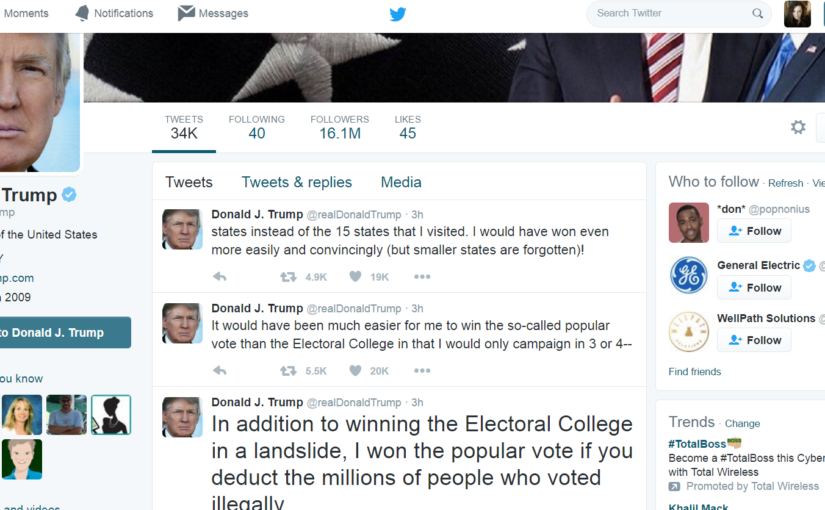Twitter will undoubtedly go down as one of the most important inventions of the 21st century. It changed the way we organize and understand information. It paved the way for global dialogue. It has exposed appalling behavior, like police violence, that might have been easily covered up in earlier times. It has truly transformed the world into a small town of sorts. Given these facts, I’m continually amazed at the people I know–some of them social-media addicts–who have never used Twitter.
Before Twitter, information was disseminated in a fairly linear, serial manner. We’re talking articles, books and so on. Things that have a beginning, a middle, and an end. Even with sites like Facebook, conversation is a straight-line thread: someone posts something and other people comment. To find information, you search for the author of the original posting, and only then can you proceed downward through the information stream. There’s only one entry point. The conversation is usually limited to those who are connected to the original poster.
While one could argue that Twitter has similarities (a post triggers a stream of comments that appear in a feed), there are some key differences:
- Any event can trigger a Twitter conversation. It doesn’t have to be a post by a single author. A conversation can begin with a hashtag on a TV show or with an impromptu hashtag that explodes into a global dialogue.
- Hashtags themselves are revolutionary: they are single strings of characters that can construe enough meaning for an article or an entire book. For example, the #trumpisnotmypresident hashtag is self explanatory. You don’t have to dissect a headline. You read that hashtag, and you know what the conversation is about. Typing it in pulls up a cacophony of comments, news stories, memes, and quips from all over the world. But it goes even farther than that. Hashtags can also serve as a “secret” code. You’re watching Survivor, someone says something crazy, like “yeah, I stole the food, and then I dug a hole and buried it,” and then a hashtag appears on the screen (like #FoodThiefLynchMob, for example). Twitter bursts into a cyclone of real-time commentary from everyone watching the show at that moment. Because the show is recorded, the cast mates are often participating in the conversation, too. Even better, the conversation persists, so if I’m watching the show later on DVR, I can still join in.
- Twitter hashtags are an ingenious way to navigate information. If I want to see what the world thinks about Martha Stewart’s new cooking show with Snoop Dogg (the world’s most random pairing), I just go to Twitter and try a couple hashtags. (I just did it. My first try produced nothing. Then I entered in “#MarthaAndSnoop” and–bam!–let the clips and quips begin. Extreme awesomeness.)
- If you’re bored or looking for a pick-me-up, go to Twitter.com and look at the stream of trending hashtags down the left side of the page. Today, #FakeChristmasSongFacts is one of those. I’m already dying laughing looking at it. A few of the top Tweets: “Only 2 Of The Hens Were French. The Other 1 Was Portuguese,” “Original version of ‘Rocking around the Christmas Tree’ had way more cowbell,” “Dean Martin’s ‘Baby, It’s Cold Outside’ was the very first instance of Netflix & Chill in modern American music.” What’s not to love?
- Twitter keeps even the most verbose concise. It’s a big bore to listen to someone whitter on about politics. But reading our charming president elect’s (@RealDonaldTrump) quips has much more impact and comedic value (one of today’s zingers: “In addition to winning the Electoral College in a landslide, I won the popular vote if you deduct the millions of people who voted illegally”).
- One of the best things about Twitter is that it democratizes global communication. It really doesn’t matter who you are. If you’re hilarious or apt in your commentary, the world will circulate your Tweet at lightning speed. Just include the right hashtag or call out the right person’s Twitter handle (which begins with “@”).
Twitter played such a large role in the 2016 presidential election that one wonders what might have happened without it. Maybe the outcome would have been the same; I don’t know. It certainly wouldn’t have been nearly as entertaining or cringeworthy. It has truly become a touchstone of modern society.
I have two different Twitter handles. I use my “professional,” upstanding handle, @briannapstevens, to promote my blog, to share news about the company I work for, and so on. My *other* Twitter handle is anonymous. It gives me the freedom to behave badly, to comment on trashy TV, and to otherwise communicate sentiments I wouldn’t want my professional community to hear. What beautiful freedom.
Net-net, I’m a massive fan, and if you’re not, then you really haven’t plumbed the depths (or the heights) yet. Go deeper than the comments. Look at how it has changed the nature of modern communication and information organization. Effing brilliant, and sure to influence and spur many more ingenious inventions in the coming years.
#talkaboutit #tellitlikeitis #theworldislistening
